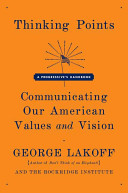Argument Frames
Functioning as a progressive or conservative means having a stock of general argument frames that are used not just on one issue but on many issues. That is why someone attuned to politics can immediately understand or construct a “new” argument as soon as a new issue arises. The “new” argument is not really new at all. It is an instance of a general argument frame with a new issue-defining frame plugged in, and sometimes a new commonplace frame or surface frame. But the overall structure and content of the argument remain the same. We’ll get to more of these argument frames in a moment, but first a bit needs to be said about the components of an argument frame.
Commonplace frames are used to understand how the world works. Some are relatively accurate. Some are grossly inaccurate. But, accurate or inaccurate, they are used in political arguments. It is important to recognize them for three reasons: so you’re not taken in by the false ones, so you can recognize and counter them, and so you can factor them out to see the more general argument frame. They can be very general, that is, applying across many issue areas, or they can be relatively specific, having bearing on only one or several issues.
Notes:
Liberals and Conservatives have a framework on which to quickly build arguments for/against new issues.
Folksonomies: debate argument framing
Taxonomies:
/law, govt and politics/legal issues (0.562986)
/science (0.409474)
/religion and spirituality/atheism and agnosticism (0.371339)
Keywords:
argument (0.955433 (positive:0.006117)), general argument frame (0.916517 (positive:0.368818)), argument frames (0.838092 (positive:0.081060)), Argument Frames Liberals (0.714729 (neutral:0.000000)), new commonplace frame (0.575949 (neutral:0.000000)), new issue-defining frame (0.547204 (positive:0.321696)), surface frame (0.425484 (neutral:0.000000)), conservative means (0.401114 (positive:0.471606)), Commonplace frames (0.380457 (negative:-0.464311)), overall structure (0.373431 (positive:0.627701)), political arguments (0.372722 (neutral:0.000000)), false ones (0.368745 (neutral:0.000000)), new issues (0.357968 (neutral:0.000000)), issue areas (0.346847 (neutral:0.000000)), Conservatives (0.250192 (neutral:0.000000)), instance (0.243782 (positive:0.321696)), stock (0.239594 (positive:0.471606)), framework (0.238933 (neutral:0.000000)), moment (0.238750 (positive:0.377068)), politics (0.235977 (negative:-0.419606)), bearing (0.235225 (negative:-0.233202)), reasons (0.234576 (neutral:0.000000)), content (0.234317 (positive:0.627701))
Concepts:
Conservatism (0.933439): dbpedia | freebase | opencyc
Argument (0.878304): dbpedia | freebase
Critical thinking (0.833564): dbpedia | freebase | opencyc | yago
Argumentation theory (0.804745): dbpedia | freebase | yago
Logic (0.804503): dbpedia | freebase | opencyc
Soundness (0.781712): dbpedia | freebase
Frame (0.747600): dbpedia
Politics (0.742468): dbpedia | freebase | opencyc





